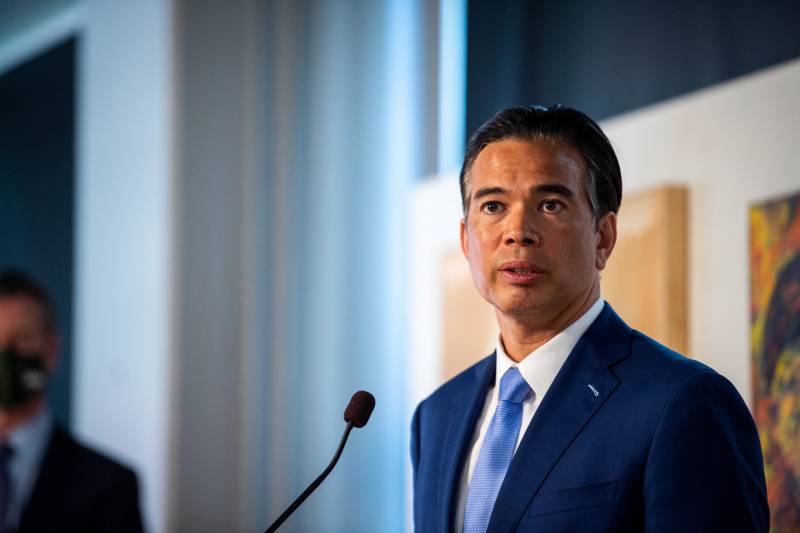But officials in California say they believe they won't encounter a similar fate, partly due to information collected during a more than two-year investigation that involved subpoenas and interviews with sellers, Amazon's competitors and current and former employees at the e-commerce giant.
In the lawsuit, California Attorney General Rob Bonta's office said Seattle-based Amazon used contract provisions to effectively bar third-party sellers and wholesale suppliers from offering lower prices for products on non-Amazon sites, including on their own websites. That, in turn, harms the ability of other retailers to compete.
"We have chosen this defendant on this issue because of the strength of the case that we have, and its impact is incredibly far-reaching and wide-ranging and has massive potential benefit for millions of Californians," said Bonta during a press conference. "If you think about the number of individuals who use the Amazon platform each day and you multiply that by the number of days in a year and 10 years, the scope and scale of this case is enormous."
Bonta said that while his office has had some discussions with representatives of Amazon leading up to today, they have not taken an official deposition of an executive at this point.
"So we’ll see what a court determines is appropriate for disclosure," said Bonta. "But between the actual contracts that Amazon has had with vendors and sellers over the last decade to the direct statements about the impact of those contracts from vendors and sellers, we feel that the evidence in total is damning and telling and supports the claims that we’ve made in the complaint."
The suit maintains merchants that do not comply with the policy could have their products stripped from prominent listings on Amazon and face other sanctions such as suspensions or terminations of their accounts. It alleges Amazon's policy essentially forces merchants to list higher prices on other sites, helping it maintain its e-commerce dominance.
Among other things, the California lawsuit seeks to stop Amazon from entering into contracts with sellers that harm price competition. It also seeks a court order to compel Amazon to pay damages to the state for increased prices. State officials did not say how much money they are seeking.
The company has said in the past that sellers set their own prices on the platform. It has also said it has the right to avoid highlighting products that are not priced competitively. In a statement sent Wednesday, Amazon reiterated those points and said Bonta has it "exactly backwards."
"The relief the AG seeks would force Amazon to feature higher prices to customers, oddly going against core objectives of antitrust law," the company said. "We hope that the California court will reach the same conclusion as the D.C. court and dismiss this lawsuit promptly."
Amazon controls roughly 38% of online sales in the U.S., more than Walmart, eBay, Apple, Best Buy and Target combined, according to the research firm Insider Intelligence. About 2 million sellers list their products on Amazon's third-party marketplace, accounting for 58% of the company's retail sales.
During a news conference on Wednesday, Bonta said some vendors have expressed they would offer lower prices on other sites with lower seller fees, but don't do so to avoid punishment from Amazon.
"Amazon has stifled its competition for years, not by successfully competing, but by blocking competition on price," Bonta said. "As a result, California families paid more, and now Amazon must pay the price."
He said the lawsuit is also a message to other companies who "illegally bend the market at the expense of California consumers, small-business owners and the economy."
The tech industry's allies also slammed the lawsuit. Adam Kovacevich, CEO of the industry trade group Chamber of Progress, which receives funding from Amazon and other tech companies, said the case would force Amazon to raise prices.
"That makes no sense while consumers shop for bargains to counter inflation, and it's based on a legally unsound theory already rejected by federal courts," Kovacevich said.
Despite that defense, Amazon's market power has been a subject of scrutiny from lawmakers and advocacy groups calling for stricter antitrust regulations. Earlier this year, congressional lawmakers urged the Justice Department to investigate whether the company collects data on sellers to develop competing products and offer them more prominently on its site. Critics also have lambasted the increasing fees imposed on sellers, which make it more difficult for merchants to enter the market.
Lawmakers on Capitol Hill have been pushing bipartisan legislation aiming to limit Amazon and other Big Tech companies, including Apple, Meta and Google, from favoring their own products and services over rivals. The bill has cleared key committees but has languished in Congress for months amid intense pushback from the companies.
Meanwhile, regulators also have been looking into Amazon's business practices and deals. In July, the company offered concessions to settle two antitrust investigations in the European Union, including a promise to apply equal treatment to all sellers when ranking product offers on the site's "buy box," a coveted spot that makes items more visible to shoppers.
In the U.S., the Federal Trade Commission is investigating Amazon's $3.9 billion acquisition of the primary health organization One Medical as well as the sign-up and cancellation practices of Amazon Prime, the company's paid subscription service that offers deals and faster shipping.
KQED's Rachael Myrow contributed reporting for this story.

